|
PHR Executive Director Donna McKay and Board Chair Kerry Sulkowicz accept the 2017 Thomas J. Dodd Prize in International Justice and Human Rights at the Dodd Center. Photo: Dodd Center
On November 2, 2017, Physicians for Human Rights received the 2017 Thomas J. Dodd Prize in International Justice and Human Rights at the University of Connecticut’s Thomas J. Dodd Research Center in Storrs, Connecticut. As part of the formal award ceremony, former U.S. Senator Christopher Dodd and the Center’s leadership presented PHR Executive Director Donna McKay and board chairman Kerry Sulkowicz with the award.
McKay then delivered the following keynote remarks to the audience: As Senator Dodd said, I’m Donna McKay, and I’m the executive director of Physicians for Human Rights. On behalf of our founders, our amazing board and staff, and our heroic partners, thank you so much for this honor. To be honored alongside Louise Arbour, the Committee to Project Journalists, Tostan, Bill Clinton, and our good friend and board member Justice Richard Goldstone is really, truly humbling. I want to thank you, Senator Dodd, for your leadership in supporting human rights as a cornerstone of U.S. policy. It’s precious to us, and I must say sorely missed right now at this moment in time. I want to thank you, Glenn, the director of the Dodd Center, for the incredible work that you do with students and young people, advisory board member Helena Foulkes, and, of course, University President Herbst. You’ve been extraordinarily generous hosts to us today and we’re looking forward to a full day tomorrow. It’s really an honor that Kerry and I are able to accept this award on behalf of Physicians for Human Rights. You know, it’s funny. Both of my parents were school teachers. And to their immense frustration, I often ended up in the principal’s office. It wasn’t because of my behavior, trust me. But it’s because I would find injustice everywhere. I was that little kid who challenged the teachers, calling them out for being unfair, standing up against the injustices of elementary and middle school. Today, my job and others’ at PHR is to make trouble working at a human rights organization that speaks out against injustice wherever we see it. I hope my principal, Mr. Cirangle, would be proud of this. 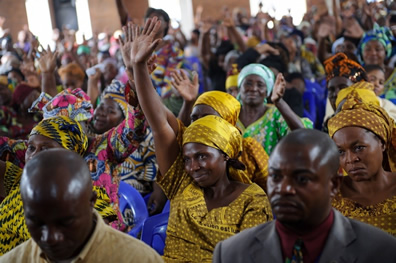
A Congolese woman raises her hand in a service for peace in the Democratic Republic of the Congo. Photo: Phil Moore/AFP/GettyImages
So today I’m here with you to share my experiences at PHR; my honest assessment of where the global human rights movement stands; and what you all can do to help us, PHR, build the next generation of human rights advocates. But first a bit about PHR. Physicians for Human Rights is a global advocacy organization. We investigate human rights abuses using the powerful lens of science and medicine. We believe – we know – that through evidence, change is possible. For the past 30 years, PHR has shined the bright light of medicine and science to reveal human rights violations around the world. We exposed the use of chemical weapons by Saddam Hussein’s Iraqi forces against the Kurds in the 1980s. We documented genocide in Darfur, making the case before the International Criminal Court. We exhumed the graves of Bosnian men and boys slaughtered at Srebrenica. Just last year, one of the perpetrators of that worst war crime in Europe since World War II, Radovan Karadzic, was convicted on the basis of evidence that PHR experts gathered some two decades ago. The second, Mladic, is scheduled to be sentenced in The Hague later this month. At PHR, we hold fast to facts – the cold, hard, unimpeachable truth that result from painstaking investigation and scientific documentation. And we believe that truth matters. Despite some claims to the contrary, there aren’t any alternatives to facts. In this era of tweets and soundbites and spin, our staff and partners do the meticulous, usually unglamorous, and often traumatic work of careful evidence gathering. As human rights crimes unfold – or are unfolding or in their aftermath – we work with doctors, crime scene investigators, forensic scientists, and public health professionals to uncover patterns of human rights violations. Identifying patterns of violations enables us to determine, for example, whether crimes against humanity have occurred, since they’re defined as widespread and systematic. Where there are patterns of abuse, there are perpetrators who set them in motion. So we and our partners take the evidence we uncover to courtrooms so the perpetrators will be prosecuted and held to account. Sadly, the need for PHR has never been greater as human rights crises demand our attention on virtually every continent today. Take Myanmar. Six hundred thousand members of the minority Rohingya ethnic group have fled across the Myanmar/Bangladesh border in just a few months. 600,000. You’ve seen the haunting images and heard of the traumatic tales of violence: children ripped from the arms of mothers and hurled into fires, entire villages torched to the ground. Burmese attackers call them cockroaches, echoing the kind of hateful language that fueled genocides in Rwanda, in Bosnia, in Germany. And while this madness is being conducted by the country’s military, it’s all taking place under the watchful eye of the country’s civilian leader, a Nobel Peace Prize laureate, Aung San Suu Kyi. The irony is devastating. So today, a team of PHR experts have rushed to a front line of this catastrophe. They are there to conduct the crucial, painstaking task of documenting evidence of atrocities. They’ll use their medical and public health skills to evaluate physical and psychological injuries. They do this at the request of local human rights groups who hope that PHR’s scientific evidence will outweigh the current propaganda. 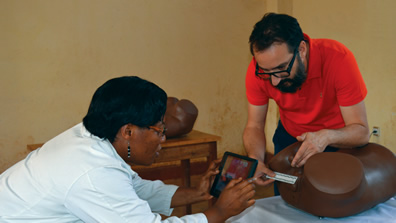
PHR consultant Georges Kuzma and Panzi Hospital’s Dr. Nadine Neema Rukunghu test a forensic documentation app. Photo: PHR
PHR’s role in the human rights movement is unique: we ask doctors and health professionals to use the skills they have acquired, their code of ethics, and their innate sense of humanity to become valiant defenders of human rights. It’s really part of the simple genius of our organization’s founders. They saw a gap in the human rights field that health professionals needed to fill. I think those same founders would agree when I say that today our role couldn’t be more crucial. Governments and international institutions are failing the victims of human rights violations. Too many leaders incite fear and even hatred of others. Parties to conflicts systematically flout humanitarian norms with impunity. I’m under no illusions that we are winning the struggle for human rights. But I’m here today to talk to you about how the movement must pivot, how we have to enlist experts like doctors and other professionals in this campaign for our rights, and how you all can be part of a greater drive toward building a world that is more fair and more just and more humane. Twelve years ago, on this same stage, South African jurist Justice Richard Goldstone explained how the crucible of the Second World War defined our modern conception of human rights. The opening salvo was the 1948 UN Universal Declaration of Human Rights, whose 70th anniversary year, by the way, will be launched next month. The Declaration was accompanied by the war crimes tribunals in Tokyo and Nuremberg, further galvanizing the ideas of universal rights and justice. It’s at Nuremberg that Thomas J. Dodd, this center’s namesake, cross-examined some of the war’s greatest war criminals. He would later call the trials “an autopsy on history’s most horrible catalogue of human crime.” Fitting for us that he would use the word autopsy. A decade later, at the height of the Cold War, the human rights movement began to take shape. Large international organizations and civil society movements emerged to expose rights violations and also promote and solidify norms. From the ashes of war emerged the hope of a new global order, institutions that were meant to protect rights and institutions that promised consequences for those who broke the law. In 1986, Physicians for Human Rights was founded in Boston to perform the actual autopsies that the elder Senator Dodd mentioned after Nuremberg. But we weren’t just focused on investigating violations. We also played a role in helping create new international treaties and norms. In 1991, we sent Dr. James Cobey to Cambodia to document the devastating effects of antipersonnel mines, a legacy of years of war. Using the tools of epidemiology, he concluded that one in every 236 people in Cambodia had stepped on a mine. Think about that number for a minute. Imagine walking in the streets of Manhattan, and every block or so passing someone with a leg or a hand that had been blown off by a mine. It’s really unthinkable. That study led to the establishment of the International Campaign to Ban Landmines. As a founding member of that campaign, we organized medical associations around the world to call for a ban on the production, sale, and deployment of these sinister, indiscriminate weapons. A landmine doesn’t know if you’re a friend or a foe, or child, or an adult. 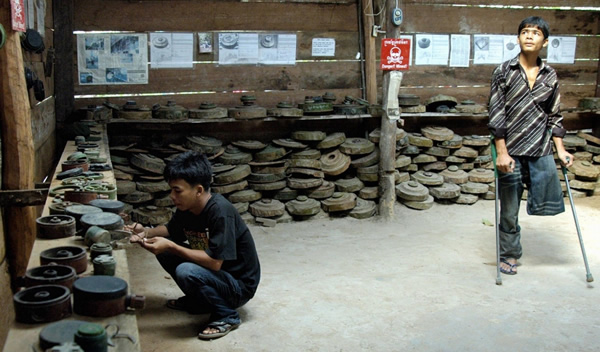
A Cambodian mine-affected boy stands next to hundreds of defused landmines in a private museum in Siem Reap. Photo: Tang Chin Sothy/AFP/Getty Images
A global mine ban treaty was signed in 1997. It came into force faster than any arms control treaty in modern history. For that work, we shared the Nobel Peace Prize. But the truth is, our victory was and continues to be incomplete. The U.S., Russia, China, and dozens of other states have failed to ratify the treaty. And we fear that with recent deployment of mines in Myanmar, for example, the strong norm against such weapons could be softening. And it’s not the only international compact that’s at risk today. One example of the undoing of norms is happening right now in Syria. According to data, painstakingly collected by PHR, there have been at least 478 intentionalor indiscriminate attacks on medical facilities since 2011. More than 800 medical personnel have been targeted and killed. The vast majority of these attacks have come at the hands of the Syrian government and their Russian allies. This is not collateral damage. This is not a consequence of the fog of war. This is a despicable, efficient strategy to terrorize civilians, murder innocents, and destroy the health system so that those who can’t flee die from a lack of health care. It’s a war crime, and because it is now both widespread and systematic, it amounts to a crime against humanity, and it needs to stop. And, of course, those who carry out these crimes must be held to account. Since the 19th century, there’s been an international consensus that doctors and hospitals are protected in times of warfare. Under the Geneva Conventions, patients, including soldiers or other combatants, are not a legitimate target once they’ve entered a hospital and laid down their arms. It’s a concept known as medical neutrality, the principle of noninterference in the provision of medical services regardless of one’s political affiliations. And yet in recent decades – in Bahrain, in Türkiye, in Kashmir, in Afghanistan, in Yemen, and Sudan – we at PHR have seen those protections steadily wane. In April, we contacted health professionals in the town of Khan Sheikhoun, where the Syrian government had unleashed a terrifying and illegal chemical weapons assault. Instead of running for their lives, medics and nurses ran into the danger. They donned whatever protective gear they could find. And they watched children convulse, foam at the mouth, and then suddenly stop moving. And just as they were rushing patients into an underground clinic, bombs rained down on the clinic itself. At least 83 people were killed that day, one third of them children. Another pillar of international law appeared to crumble into dust. In recent years, polio vaccination teams in Pakistan have been attacked. In Mali, militants have stolen ambulances and destroyed medical clinics. In Türkiye, security forces have taken over hospitals and blocked emergency vehicles from reaching clinics. And though many of these attacks are clear violations of international laws and norms, they almost always go unpunished. We don’t have to live in these countries for this growing practice to offend every sensibility. At Physicians for Human Rights, we are marshalling a global movement of health professionals and their allies to say: no more. We will not look away. We will not tolerate the murder of one more doctor or the bombing of one more hospital. And we will call out these atrocities wherever and whenever they occur. Because here’s the thing. Laws and rights and norms like the prohibition against attacking hospitals or a global ban on landmines aren’t just won. They have to be defended every day. But how do we do that when we sense that governments are failing us? When international treaties are routinely ignored? When members of UN Security Council are paralyzed by their politics? When I first joined the human rights movement, we were at a similar junction. The Reagan administration was rolling back the implementation of human rights standards globally. And that’s exactly when I joined Amnesty International. Because each time the movement has had setbacks, we’ve rebuilt with greater strength. We don’t fully know yet what will rise from the ashes of these times. But it’s clear that it’s time for everyone – physicians, but also engineers and teachers and lawyers, really everyone who believes in human rights – to build a popular movement not just of resistance but of hope. A movement to support human rights that isn’t just elite organizations and western leaders but a movement of all, by all, and for all. We alone won’t be able to lead a popular movement, but we are optimistic that we can mobilize physicians, nurses, scientists, and others in the health professions to bring their specialized skill set and inherent credibility to the goal of reclaiming lost ground and furthering human rights. In many ways, this group, because of its stature in many communities, has an inherent credibility and thus a disproportionate impact. So we intend to double down. To invest in growing this network. To do that, we’re becoming force multipliers. We will plant the seeds of humanity in fertile ground. And there is no more fertile ground than in the minds and hearts of health professionals, those who are trained to heal and to protect. Let me give you an example. One of our close friends and dear partners is a man named Dr. Denis Mukwege. At his Panzi Hospital in the Democratic Republic of the Congo, he performs gynecologic surgery to repair the bodies of women and girls who’ve been brutally raped. But after years of doing this painstaking work, he realized he could no longer just repair the broken bodies of his patients. He needed to become his patients’ advocate. So we helped train him and his medical staff in best forensic practices. How to collect evidence. Document it. Preserve it. And present it in court. 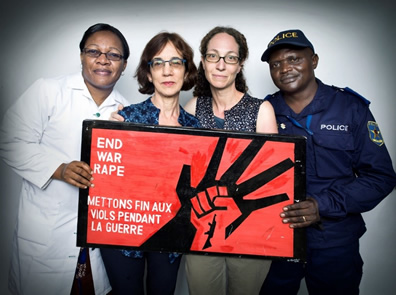
Dr. Nadine Neema Rukunghu of Panzi Hospital in the DRC, PHR’s director of international policy and partnerships, Susannah Sirkin, PHR’s Program on Sexual Violence in Conflict Zones director, Karen Naimer, and DRC Police Col. David Bodeli Dombi. Photo: Platon for The People’s Portfolio
But it takes more than receptive health professionals. We also work with lawyers and police officers and judges to ensure that evidence can be wielded during justice proceedings. Dr. Mukwege is now a leader fighting impunity for sexual violence in Congo and all around the world. The same thing has happened in Kenya, where nurses we trained have become trainers themselves. And, last year, more than 35 years after the bodies of a group of Afghans were dumped into a mass grave, two dozen PHR-trained Afghan forensic scientists carried out their country’s first mass grave exhumation. The women and men of our networks are expanding human rights and acting as agents of change in their own communities. And collectively, they advance human rights more than any one single organization ever could. Think about some of the human rights violations we’ve experienced here in the United States. You’re familiar with the ongoing lead poisoning of drinking water in Flint, Michigan. What you may not realize is that it was a pediatrician who showed and spoke out about the doubling and sometimes tripling of lead levels in children’s blood. For her efforts, she was accused of whipping up “hysteria.” And yet, she persisted. And, by the way, this courageous pediatrician, Dr. Mona Hanna-Attisha, is the daughter of Iraqi immigrants. All of us must be willing to stand up against authority if that’s what’s required to be on the side of human rights. In the dark years following 9/11, the U.S. torture program was designed and enabled, grotesquely, by a small group of health professionals. Those trained explicitly to ‘do no harm’ implemented ineffective, illegal, and indeed harmful methods of torture that damaged countless lives. This year, we broke ground with a report showing that health professionals in the U.S. torture program essentially engaged in human experimentation, testing their brutal methods on prisoners in direct violation of the Nuremberg Codes. And you may have heard: two of the psychologists who designed the program just settled a lawsuit in the state of Washington with three former detainees, a major victory for accountability and a day of reckoning for all the torture program’s victims. Health professionals should never be co-opted into violations of human rights, and we must support those who are asked to do so and, based on their ethics, must refuse. That’s why we publicly supported a Navy nurse stationed at Guantánamo Bay who, defying orders, refused to violate medical ethics and force feed a hunger-striking detainee. It’s why we support health professionals like the Utah nurse who rejected a police officer’s demand that she draw blood from an unconscious patient. The more health professionals are willing to stand up against injustice, the better able we are to prevent human rights abuses, and the more successful our cause will be. In short, we’re working to build a movement, led by health professionals but not exclusively limited to them. At a time of isolationism, we won’t be isolated. Our colleagues will communicate across borders. They will stand up for one another. And at a time when we face incredible challenges, they will help lead the way toward a better future. In fact, they already are. A few years ago, we trained health professionals from Syria, many who crossed over the borders into Jordan and Türkiye, others still working inside Syria. We trained them in the international standards to document torture and ill-treatment – standards we helped develop in the 1990s. We did this because they wanted to be a part of the future justice process in their country, should one emerge. But we didn’t just supply technical skills. We imparted the language of human rights and shared the common currency of human welfare. These doctors thus become leaders in their own right. I’m thinking about Dr. Mohammad who was part of our training program very early on, after the war started. And I can recall him sitting across the room as we’re doing this training and him saying, “Excuse me, but this language is new to us. This concept of human rights is not something we have experience with, and the freedoms you talk about are not something that we’ve had.” We’ve stayed good friends. And just recently I saw a post on his Facebook page speaking out against the atrocities being brought upon the Rohingya. A doctor, right now working in a surgical hospital built into a cave for protection, speaking out against the injustices of another. They have become advocates, speaking out for others. And they’ve latched onto human rights, and they are not letting go. 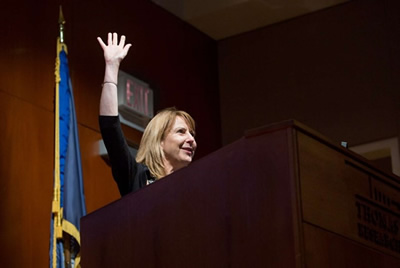
PHR Executive Director Donna McKay delivers speech after accepting award at the Dodd Center in Connecticut, USA. Photo: Dodd Center
Now for the interactive part of the talk. So who in this room attended the women’s march? Show of hands, please? Yeah, I thought it would be a lot. So you’ve already enlisted in the movement. The women’s march was one of the largest global mobilizations in history. A new generation of leaders is emerging. More voices are speaking out, urging their governments, their companies, and their broader communities to live up to the highest standards of human rights. It’s amazing to watch. History has proven that once you start speaking the language of rights and humanity, it’s nearly impossible to put that good genie back in the bottle. One of the most inspiring figures I’ve met during my five years at PHR is Dr. Şebnem Korur Fincancı. A leading light in Türkiye’s anti-torture movement, she’s spent her career fighting for those at the margins of society: the disenfranchised and the dispossessed. She collected evidence for the first successful prosecution of Turkish security forces for torture. 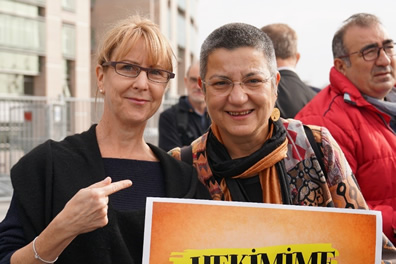
Şebnem Korur Fincancı and PHR Executive Director Donna McKay in Türkiye. Photo: PHR
But she doesn’t limit the struggle to her home country. She’s part of an international group of forensic and torture experts who go around the world, advising governments and policymakers on how to eliminate torture. Instead of being honored as the hero that she is, back home she is facing serious persecution. She took part in a free speech campaign for a Turkish newspaper and was promptly arrested and charged with trumped up terrorism charges. One year ago, I attended Dr. Fincancı’s first court appearance in Istanbul. Here was a hero of the human rights movement, staring down the real possibility of facing years in prison, and she was beaming. She joked about how after so many years of petitioning the government, she may finally have the chance to investigate Turkish prison conditions from the inside. But mostly, her joy and strength came from the many people who came from several countries to support her case. She actually turned her trial into what she called a celebration of humanity. It’s that kind of resilience that I ask you to emulate. I ask you, in our cynical age, to be voices of optimism. In a time when we feel splintered and disconnected, to find purpose in our common humanity. Tyrants and dictators want us to despair. Because they know that despair leads to dejection and dejection leads to giving up. Go search for your heroes and draw your energy and inspiration from them. They are everywhere. One of my heroes is a man named Dr. Jack Geiger. One more story, if you’ll indulge me. Jack, a founder of PHR and a pioneer in the community health movement, helped start the country’s first rural community health center in Mound Bayou, Mississippi in 1965. As he started working in the community of former sharecroppers, he found that so many of the kids were suffering from malnutrition. So, he started writing prescriptions for food that the local grocer would then bill back to the center’s pharmacy. The federal office financing the health center caught wind of this system and dispatched an official to reprimand Jack for using dollars earmarked for medical services on food. When confronted, Jack just replied: “The last time I looked in my medical textbooks, the best therapy for malnutrition is food.” And the official let him be. I pray for a world in which everyone thinks like Jack. A world in which we all look for solutions in earnest; tell the plain truth to those in power and see the value in every human life; stand up for those who don’t have a voice; and work tirelessly to empower every person to become a defender of human rights and human dignity. Because you see, leadership doesn’t just come from governments, it comes from each and every one of us. From people like Jack. From you. Thank you so much on behalf of all my colleagues for this honor. And thank you for believing in human rights. Thank you for honoring us and all those health professionals who are ready to stand up for justice and lead us to a brighter future. You may watch a recording of the event here: |
PHR Awarded 2017 Dodd Prize in Human Rights

